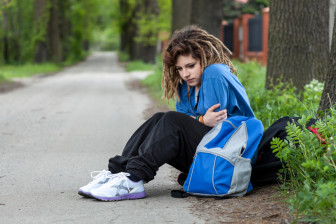This much we know: Boys and girls are different.
![]() We also know this: Adolescence is the most challenging time of life, and teen girls are particularly challenged to get through those years unscathed. Suicide attempts spike during the teen years, yet even with all that, it’s tough to know what’s “normal,” and what is cause for alarm.
We also know this: Adolescence is the most challenging time of life, and teen girls are particularly challenged to get through those years unscathed. Suicide attempts spike during the teen years, yet even with all that, it’s tough to know what’s “normal,” and what is cause for alarm.
And that’s even truer for girls.
By the time girls and boys hit their teen years, girls are more than twice as likely to be diagnosed with a mood disorder than are teen boys. A 2012 Substance Abuse and Mental Health Services Administration (SAMHSA) report says each year, an average of 1.4 million girls between 12 to 17 years old suffer from a major depressive episode. That’s three times higher than the rate of boys the same age. The American Psychiatric Association says a major depressive episode lasts at least two weeks, and includes symptoms such as problems with eating, sleeping and concentration, among others.
Why are girls more likely to suffer from depression or anxiety disorders?

iStock Photo
Teen girls often internalize their feelings.
Typically – though not always — says Kimberly Nelson, vice president of children’s outpatient and community-based services at Wheeler Clinic, “females tend to internalize, so they tend to keep stuff in.” And that is a major contributor to depression and anxiety.
“If you take that simple explanation that boys tend to be more active,” Nelson said. “Think about a typical boy. He tends to be more active and behaviorally activated, and girls tend to be quieter.”
That doesn’t mean adolescent boys are able to sidestep depression and anxiety disorders, she said, and research – including some from the National Institute of Mental Health — says that depression in an adolescent looks different from depression in an adult. Mental health service providers are learning to respond with teen-centered research in mind, and that means immediacy.
“The days of you calling and getting an appointment two months away, that’s useless,” said Nelson. “That person, that adolescent is going to be in a very different place.”
In fact, the state Department of Children and Families offers a free emergency mobile psychiatric services to youths and families. Families with a child in trouble can access the service by calling United Way’s 2-1-1. A trained counselor from that family’s area either resolves the crisis over the phone – immediately – or travels to the child, whether that child’s at home or elsewhere, like school. The service is available 24 hours, seven days a week, and is free to families. The Wheeler Clinic alone served some 3,200 youths last year through the program, and the number has risen over the last two years, Nelson said. The program is more than a decade old, but has undergone changes over the years to meet the needs of the state’s youth, said Tanya Barrett, senior vice president of 2-1-1 Health and Human Services, a program of United Way of Connecticut.
Overall, the service served 17,697 families last fiscal year, said Barrett. And the program is growing – which is a good thing, said Barrett. Every family that is successfully helped by the service is one less family with a juvenile in the justice system, or in the hospital.
On Thursday, C-HIT will host a community forum on teen mental health at The Lyceum, 227 Lawrence St., Hartford. The event, which features an expert panel, is being held in collaboration with ConnectiCare and Hartford Hospital’s Institute of Living. For information and to purchase a ticket, go here.